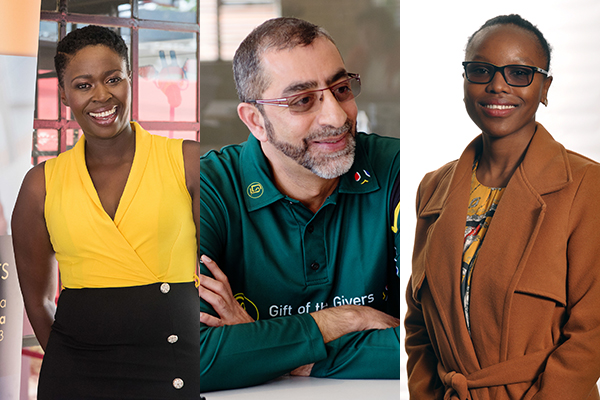
Leah Molatseli (left), Dr Imtiaz Sooliman, and Likeleli Monyamane will be
the guest speakers during the End-of-year Graduation Ceremonies
at the University of the Free State.
Photos: Supplied, www.mudboots.co.za
Roads and entrance closed due to roadworks on the Bloemfontein Campus
Graduation Livestream
Two honorary doctorates and a Chancellor’s medal will be some of the highlights during the End-of-year Graduation Ceremonies at the University of the Free State (UFS).
The Callie Human Centre on the Bloemfontein Campus will once again welcome graduates, their parents, friends, and relatives for the celebrations on 6 and 7 December 2017. A total number of 1226 qualifications, including diplomas, certificates, and degrees, will be conferred during the two days.
Altogether 40 doctorates and 109 master’s degrees will be awarded. Most doctorates (19) will be awarded in the Faculty of Natural and Agricultural Sciences, while most of the master’s degrees (27) are in the same faculty.
Prof Holloway, Botha, and Isaacs honoured
Prof Paul Holloway (Natural and Agricultural Sciences) and Marius Botha (Law) will receive honorary doctorates during the afternoon ceremony on 7 December 2017, while Joyene Isaacs (Natural and Agricultural Sciences) will be honoured with a Chancellor’s Medal.
Prof Holloway is an internationally acclaimed expert in the science and technology of surfaces, thin films, and nanoparticles, and Botha has played a significant role in financial planning in South Africa. Isaacs is the Head of Department of the Western Cape Department of Agriculture, and her department has been nominated by the South African Institute of Government Auditors as the best government department.
Young leader, young alumnus, and humanitarian
Likeleli Monyamane, Leah Molatseli, and Dr Imtiaz Sooliman will be the guest speakers at the ceremonies.
Monyamane, a UFS Council member, will address graduates on 6 December 2017 during the morning ceremony. She is one of 15 young leaders selected to represent Lesotho as participants in the Mandela Washington Fellowship in the United States. In 2016, Molatseli, the speaker during the afternoon session on 6 December 2017, launched South Africa’s first legal ecommerce website, Lenoma Legal, and is the university’s most recent Young Alumnus of the Year.
Dr Sooliman, the speaker at both ceremonies on 7 December 2017, is the founder and Director of the Gift of the Givers Foundation. He has received more than 100 national and international awards, citations, commendations, and special recognition for his humanitarian work.
Date: 6 December 2017
Time: 09:00: All qualifications up to Honours degrees in the Faculty of Economic and Management Sciences (including the Business School) and the Faculty of Natural and Agricultural Sciences
14:30: All qualifications up to Honours degrees in the Faculties of Education, Law, the Humanities, and Theology
Date: 7 December 2017
Time: 09:00: All qualifications up to Honours degrees in the Faculty of Health Sciences and Educational qualifications in Open Distance Learning – South Campus
14:30: Master’s and Doctoral degrees in all faculties
For information about the ceremonies, click here to visit the graduation home page.